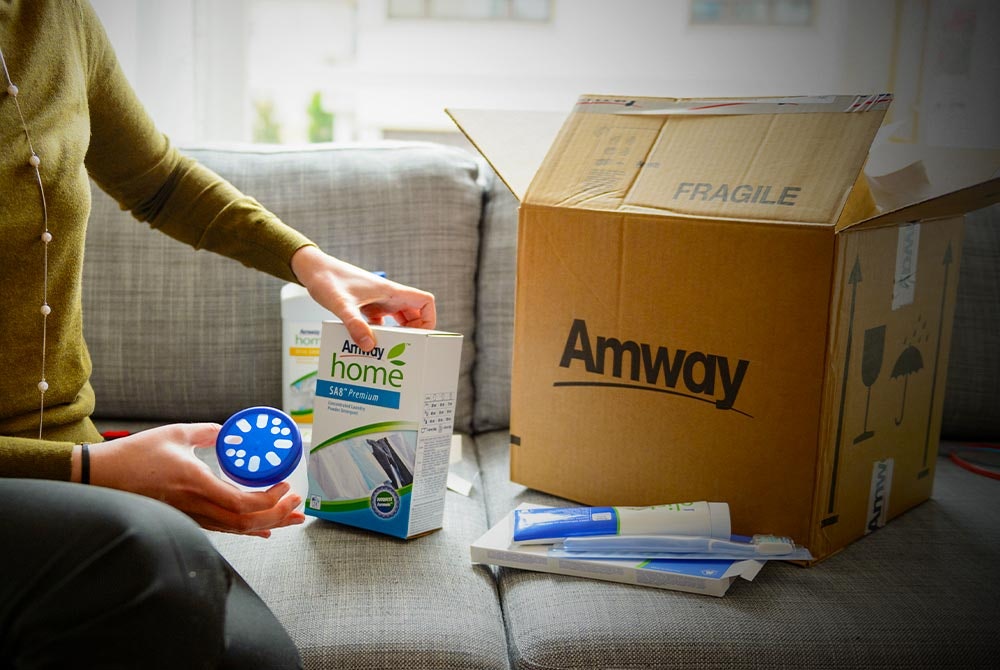- The History of the Amway Pyramid Scheme: Why It Isn't One
- Why the Controversy? (The Amway Pyramid Scheme)
- Can You Make Money Through Amway?
- Is Amway a Pyramid Scheme Because of the Point System?
- How Does Amway Make Money?
- Frequently Asked Questions
Founded in 1959, Amway, short for The American Way, is a multi-level marketing (MLM) business that sells various products such as makeup, cookware, cleaning products, and nutritional products like vitamins and energy drinks. According to a lawsuit in 1979, Amway is a legitimate business. Yet, many people believe the Amway pyramid scheme exists and that courts need to investigate this case again.
The History of the Amway Pyramid Scheme: Why It Isn't One
Amway's history is controversial depending on people's perceptions of pyramid schemes and how multi-level marketing companies operate. (Amway is said to be the original blueprint for the MLM business model.)
Founders Jay Van Andel and Richard DeVos worked for Nutrilite, which sold America's first multi-vitamin. They started as dietary supplement distributors but worked hard to get recruits (independent business owners) under them and eventually had a team of more than 5,000 people. Of course, when they left Nutrilite to start Amway, they took their best distributors with them to get the MLM company started.
Amway: Pyramid Scheme or Not?
Today, the Amway business owns Nutrilite and sells it alongside their various products and isn't considered a pyramid scheme because:
- They market and sell legitimate and quality products
- They don't advertise that you get paid directly for recruiting people
- Amway distributors are required to sell products
- Amway distributors aren't required to order a minimum amount of products
- You can't make money just off recruiting (you must sell products)
Why the Controversy? (The Amway Pyramid Scheme)
Amway focuses on the message of building your own business, and in some ways, the Amway business structure has some similarities with pyramid schemes, such as:
- The requirement to buy their products before you sell them
- The difficulty in selling Amway products
- The ability to make money by recruiting new Amway distributors
While Amway technically isn't considered a pyramid scheme, they coined the multi-level marketing (MLM) business model, which is the blueprint for many scams.
Regardless of its negative reputation, especially in the U.S., Amway continues to succeed by bringing around $8 billion in revenue a year via Amway business owners.
What is a Pyramid Scheme?
A pyramid scheme is an illegal business model where most profits are funneled to the top. It usually involves recruiting other distributors/salespeople, who then recruit their own Amway distributors underneath them. The more people you recruit (and the more people your distributors recruit), you make more money.
Pyramid schemes don't involve the actual sale of products—independent business owners usually need to pay to join, which is where the money comes from.
Can You Make Money Through Amway?
There are two main ways to make money with Amway:
- Sell Amway products
- Recruit new distributors or IBOs
Welling Amway Products
Amway considers all of its distributors Independent Business Owners (IBOs). The first way you can make money is from the profit made by selling Amway products. As an IBO, you have to buy Amway products first at a "wholesale" price, which the company claims are reasonable.
You can then set your own prices when selling these products to consumers. This puts you, the IBO, in charge of how much money you can earn from selling the products.
Much of Amway's controversy comes from the difficulty the majority of distributors face when trying to sell these products for a profit or even just to break even. As a result, Amway encourages IBOs to use their inventory in live demonstrations to help increase sales and recruit new distributors.
Recruiting Distributors
Recruiting new distributors or independent business owners is the second way of making money through Amway, which is marketed as a bonus for growing your business. (This is why Amway isn't considered a pyramid scheme, since recruiting is a secondary or bonus method to making money.)
While you don't get a direct payment for recruiting new members, you are instead incentivized with a point system that rewards those who can recruit the most members. (This is how Amway can avoid being called a pyramid scheme.)
Is Amway a Pyramid Scheme Because of the Point System?
Amway's point system is how bonuses and other income are calculated. Here's how it works in a nutshell:
- Business Volume (BV) = Dollar amount you spend on Amway products.
- Point Value (PV) = Used to estimate the minimum product you or your group should be selling. (Typically a third of the BV.)
- E.g., $3 spend (BV) = 1 PV
The number of PV points you or your group receives determines the percentage you get back from the BV amount.
For example:
- If your PV = 1,500, your BV = $4,500.
- 1,500 PV means you would receive 15% of the BV (~$675).
- You get $675 back from the $4,500 you spent on products.
Although this doesn't include the profit you make off selling items, the money you're making is not even close to breaking even—it's common to lose money with MLMs like Amway.
How the Point System Protects Amway
The recruiting point system gives Amway another way to avoid being considered a pyramid scheme. The design makes it possible for Amway distributors lower on the totem pole to earn more income than the person who recruited them. This is possible when a person lower on the totem pole has the same PV points as the person who recruited them.
Bringing as many distributors into your business as you can handle is smart because the more you spread out the PV points between Amway distributors, the more likely you will get a bigger bonus after your sales.
Can You Make Money Through Recruitment?
This business model is only logical if you have independent business owners working under you that don't plan on recruiting any other members and are satisfied with making a minimal profit.
To succeed with Amway, you want to have the highest PV possible, so you're getting the maximum percentage of your BV back. Yet, you want to have as many distributors under you as possible to spread out the PV points between them and maximize your profit.
How Does Amway Make Money?
While Amway does make money through product sales (direct to consumer), that's a tiny portion of the company's revenue. Amway's business model works because distributors must first buy products in bulk to resell them to consumers.
So, Amway makes a lot of its money from distributors buying products—distributors are essentially Amway's customers (although it's never marketed that way).


Comments